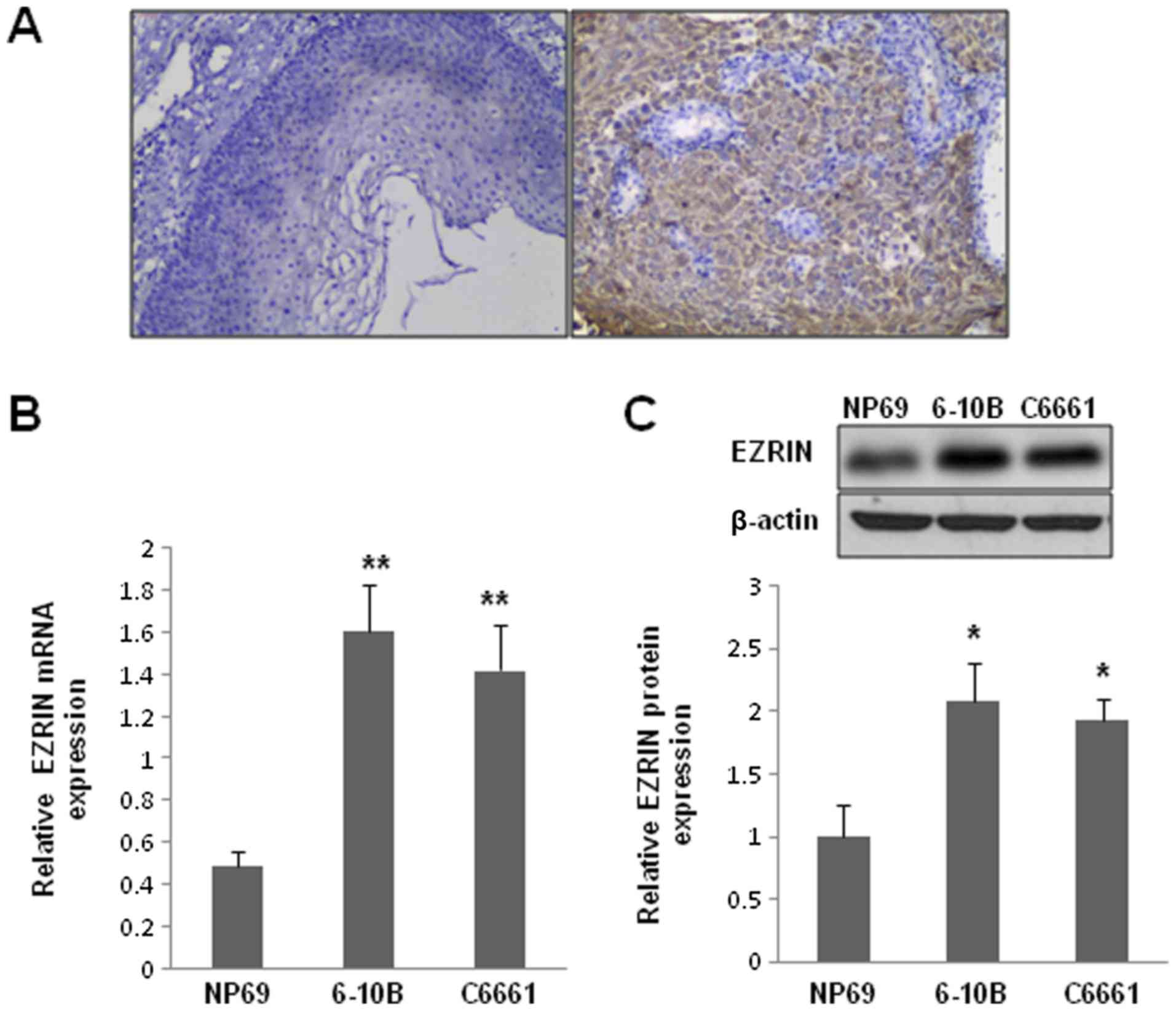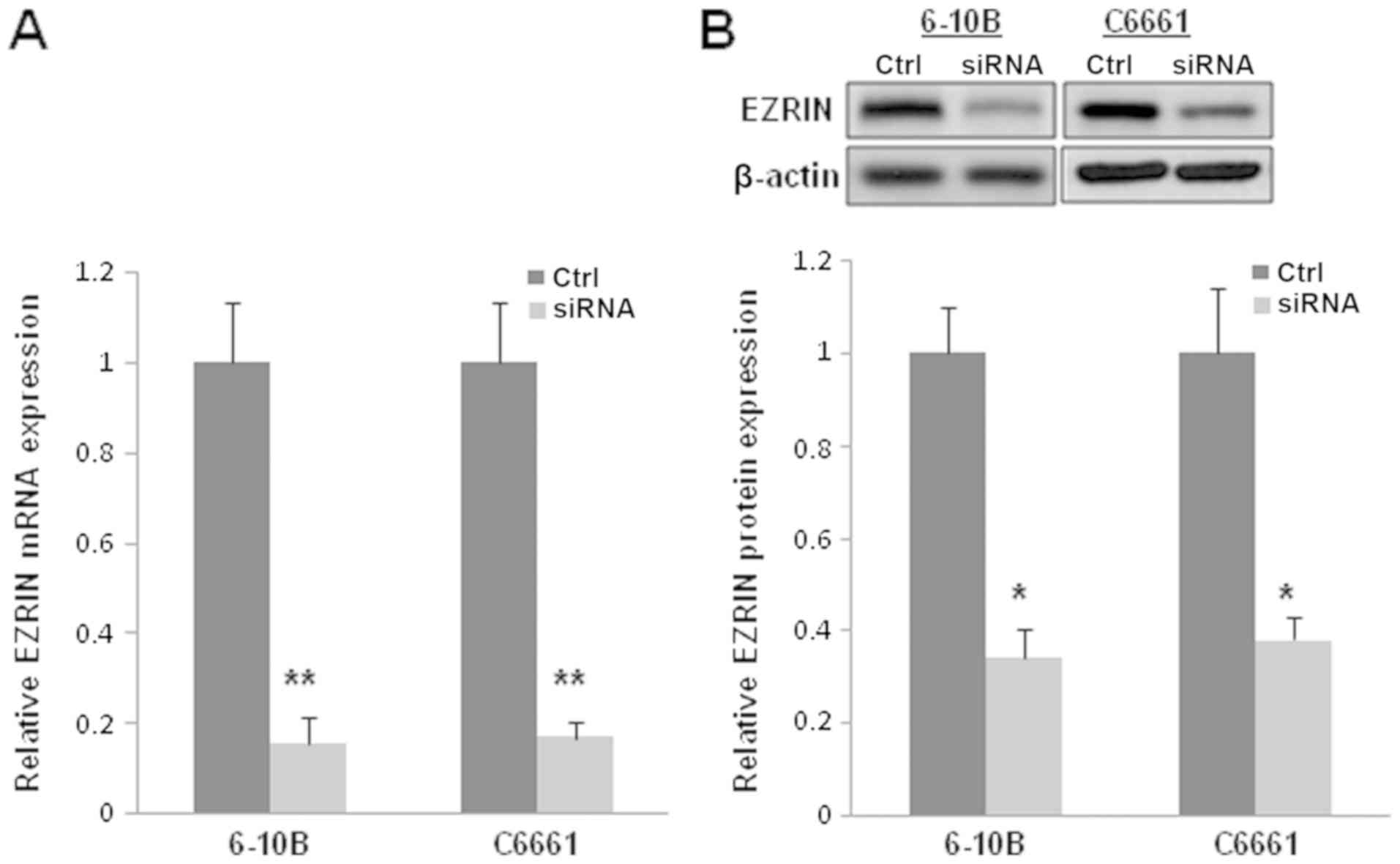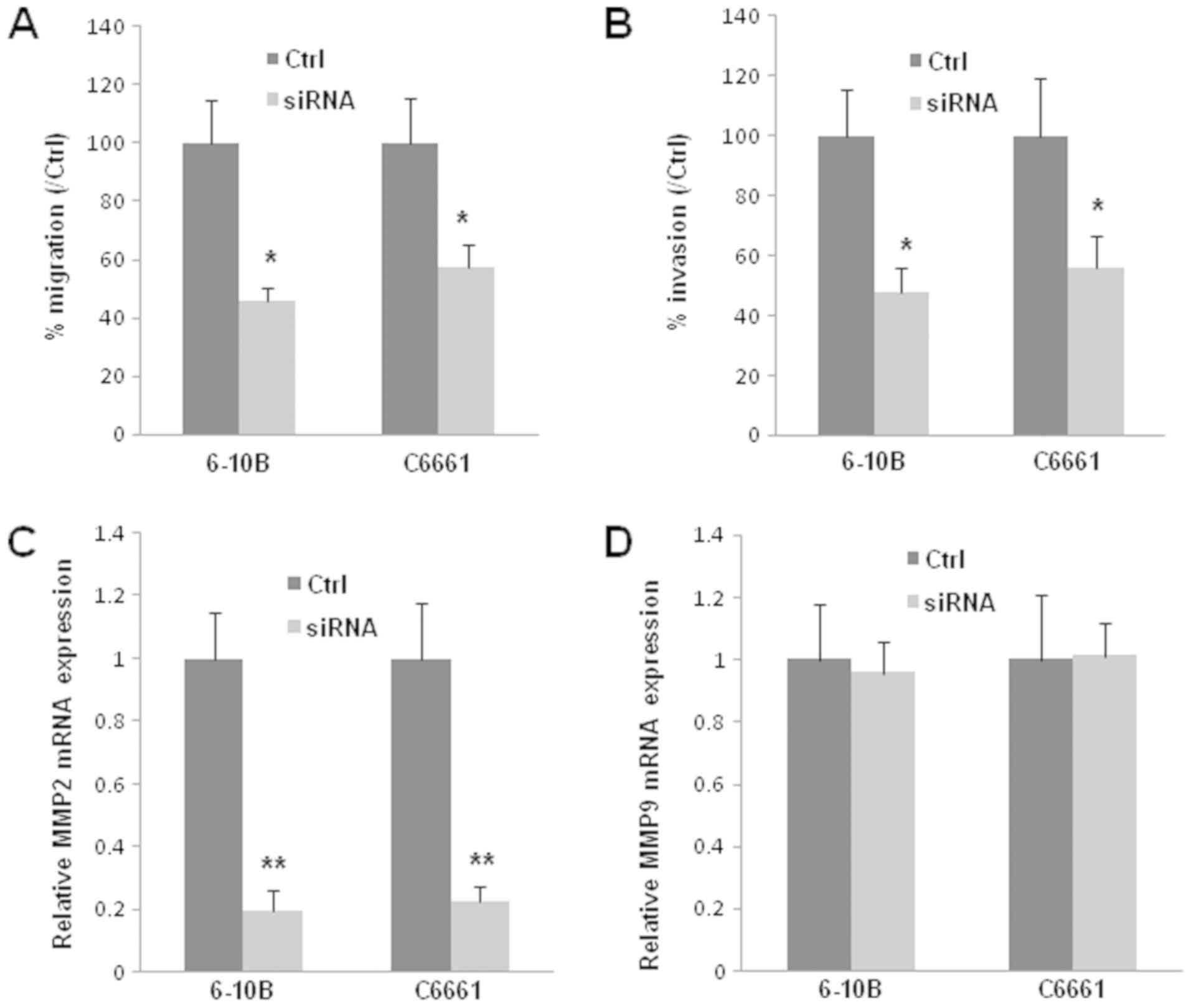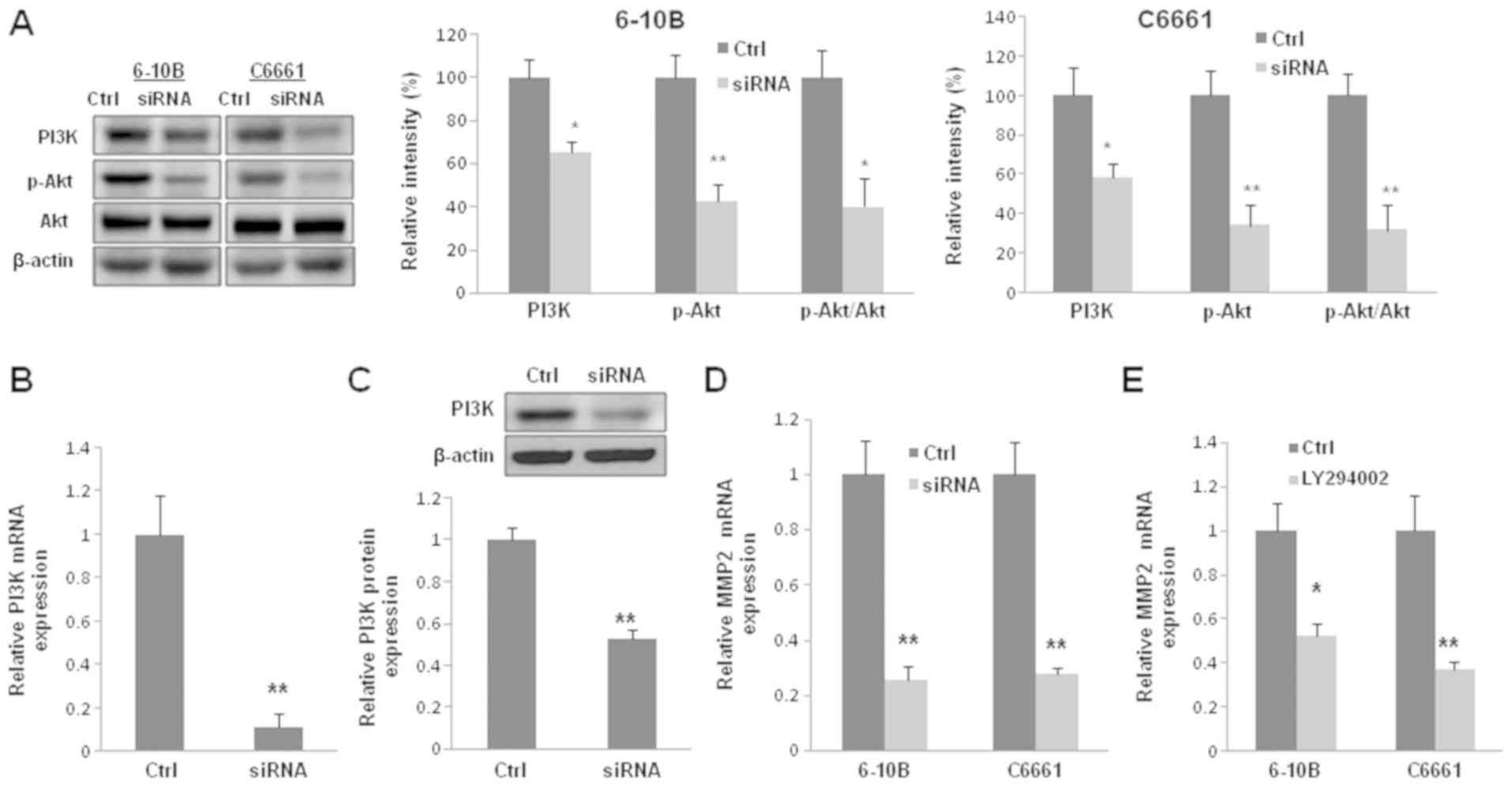|
1
|
Wei WI and Sham JS: Nasopharyngeal
carcinoma. Lancet. 365:2041–2054. 2005. View Article : Google Scholar : PubMed/NCBI
|
|
2
|
Chan JY: Surgical management of recurrent
nasopharyngeal carcinoma. Oral Oncol. 50:913–917. 2014. View Article : Google Scholar : PubMed/NCBI
|
|
3
|
Stoker SD, Van Diessen JN, de Boer JP,
Karakullukcu B, Leemans CR and Tan IB: Current treatment options
for local residual nasopharyngeal carcinoma. Curr Treat Options
Oncol. 14:475–491. 2013. View Article : Google Scholar : PubMed/NCBI
|
|
4
|
Ong YK, Solares CA, Lee S, Snyderman CH,
Fernandez-Miranda J and Gardner PA: Endoscopic nasopharynxgectomy
and its role in managing locally recurrent nasopharyngeal
carcinoma. Otolaryngol Clin North Am. 44:1141–1154. 2011.
View Article : Google Scholar : PubMed/NCBI
|
|
5
|
Bretscher A: Purification of the
intestinal microvillus cytoskeletal proteins villin, fimbrin, and
Ezrin. Methods Enzymol. 134:24–37. 1986. View Article : Google Scholar : PubMed/NCBI
|
|
6
|
Majander-Nordenswan P, Sainio M, Turunen
O, Jääskeläinen J, Carpén O, Kere J and Vaheri A: Genomic structure
of the human Ezrin gene. Hum Genet. 103:662–665. 1998. View Article : Google Scholar : PubMed/NCBI
|
|
7
|
Egerton M, Burgess WH, Chen D, Druker BJ,
Bretscher A and Samelson LE: Identification of Ezrin as an 81-kDa
tyrosine-phosphorylated protein in T cells. J Immunol.
149:1847–1852. 1992.PubMed/NCBI
|
|
8
|
Hiscox S and Jiang WG: Ezrin regulates
cell-cell and cell-matrix adhesion, a possible role with
E-cadherin/beta-catenin. J Cell Sci. 112:3081–3090. 1999.PubMed/NCBI
|
|
9
|
Crepaldi T, Gautreau A, Comoglio PM,
Louvard D and Arpin M: Ezrin is an effector of hepatocyte growth
factor-mediated migration and morphogenesis in epithelial cells. J
Cell Biol. 138:423–434. 1997. View Article : Google Scholar : PubMed/NCBI
|
|
10
|
Deng X, Tannehill-Gregg SH, Nadella MV, He
G, Levine A, Cao Y and Rosol TJ: Parathyroid hormone-related
protein and Ezrin are upregulated in human lung cancer bone
metastases. Clin Exp Metastasis. 24:107–119. 2007. View Article : Google Scholar : PubMed/NCBI
|
|
11
|
Akisawa N, Nishimori I, Iwamura T, Onishi
S and Hollingsworth MA: High levels of Ezrin expressed by human
pancreatic adenocarcinoma cell lines with high metastatic
potential. Biochem Biophys Res Commun. 258:395–400. 1999.
View Article : Google Scholar : PubMed/NCBI
|
|
12
|
Kang YK, Hong SW, Lee H and Kim WH:
Prognostic implications of Ezrin expression in human hepatocellular
carcinoma. Mol Carcinog. 49:798–804. 2010.PubMed/NCBI
|
|
13
|
Freeman WM, Walker SJ and Vrana KE:
Quantitative RT-PCR: Pitfalls and potential. Biotechniques.
26:112–125. 1999. View Article : Google Scholar : PubMed/NCBI
|
|
14
|
Livak KJ and Schmittgen TD: Analysis of
relative gene expression data usingreal-time quantitative PCR and
the 2(-Delta Delta C(T)) method. Methods. 25:402–408. 2001.
View Article : Google Scholar : PubMed/NCBI
|
|
15
|
Takahashi M, Sugiura T, Abe M, Ishii K and
Shirasuna K: Regulation of c-Met signaling by the tetraspanin
KAI-1/CD82 affects cancer cell migration. Int J Cancer.
121:1919–1929. 2007. View Article : Google Scholar : PubMed/NCBI
|
|
16
|
Fei Y, Wang J, Liu W, Zuo H, Qin J, Wang
D, Zeng H and Liu Z: CD151 promotes cancer cell metastasis via
integrins α3 β1 and α6 β1 in vitro. Mol Med Rep.
6:1226–1230. 2012. View Article : Google Scholar : PubMed/NCBI
|
|
17
|
Spano JP, Busson P, Atlan D, Bourhis J,
Pignon JP, Esteban C and Armand JP: Nasopharyngeal carcinomas: An
update. Eur J Cancer. 39:2121–2135. 2003. View Article : Google Scholar : PubMed/NCBI
|
|
18
|
Chiang AC and Massagué J: Molecular basis
of metastasis. N Engl J Med. 359:2814–2823. 2008. View Article : Google Scholar : PubMed/NCBI
|
|
19
|
Peng S, Fan S, Li X, Wang L, Liu H, Zhou
M, Wang L, Shen S and Li G: The expression of Ezrin in NPC and its
interaction with NGX6, a novel candidate suppressor. Cancer Sci.
98:341–349. 2007. View Article : Google Scholar : PubMed/NCBI
|
|
20
|
Martin TA, Harrison G, Mansel RE and Jiang
WG: The role of the CD44/Ezrin complex in cancer metastasis. Crit
Rev Oncol Hematol. 46:165–186. 2003. View Article : Google Scholar : PubMed/NCBI
|
|
21
|
Hunter KW: Ezrin, a key component in tumor
metastasis. Trends Mol Med. 10:201–204. 2004. View Article : Google Scholar : PubMed/NCBI
|
|
22
|
Poullet P, Gautreau A, Kadaré G, Girault
JA, Louvard D and Arpin M: Ezrin interacts with focal adhesion
kinase and induces its activation independently of cell-matrix
adhesion. J Biol Chem. 276:37686–37691. 2001. View Article : Google Scholar : PubMed/NCBI
|
|
23
|
Krishnan K, Bruce B, Hewitt S, Thomas D,
Khanna C and Helman LJ: Ezrin mediates growth and survival in
Ewing's sarcoma through the AKT/mTOR, but not the MAPK, signaling
pathway. Clin Exp Metastasis. 23:227–236. 2006. View Article : Google Scholar : PubMed/NCBI
|
|
24
|
Hatzoglou A, Ader I, Splingard A, Flanders
J, Saade E, Leroy I, Traver S, Aresta S and de Gunzburg J: Gem
associates with Ezrin and acts via the Rho-GAP Protein Gmip to
down-regulate the Rho pathway. Mol Biol Cell. 18:1242–1252. 2007.
View Article : Google Scholar : PubMed/NCBI
|
|
25
|
Chen Y, Wang D, Guo Z, Zhao J, Wu B, Deng
H, Zhou T, Xiang H, Gao F, Yu X, et al: Rho kinase phosphorylation
promotes Ezrin-mediated metastasis in hepatocellular carcinoma.
Cancer Res. 71:1721–1729. 2011. View Article : Google Scholar : PubMed/NCBI
|
|
26
|
Ou-Yang M, Liu HR, Zhang Y, Zhu X and Yang
Q: ERM stable knockdown by siRNA reduced in vitro migration and
invasion of human SGC-7901 cells. Biochimie. 93:954–961. 2011.
View Article : Google Scholar : PubMed/NCBI
|
|
27
|
Yang XY, Ren CP, Wang L, Li H, Jiang CJ,
Zhang HB, Zhao M and Yao KT: Identification of differentially
expressed genes in metastatic and non-metastatic nasopharyngeal
carcinoma cells by suppression subtractive hybridization. Cell
Oncol. 27:215–223. 2005.PubMed/NCBI
|
|
28
|
Shen ZH, Chen XY and Chen J: Impact of
up-regulation Ezrin expression by Epstein-Barr virus latent
membrane protein 1 on metastasis ability of nasopharyngeal
carcinoma cells. Ai Zheng. 27:165–169. 2008.(In Chinese).
PubMed/NCBI
|
|
29
|
Khokha R and Denhardt DT: Matrix
metalloproteinases and tissue inhibitor of metalloproteinases: A
review of their role in tumorigenesis and tissue invasion. Invasion
Metastasis. 9:391–405. 1989.PubMed/NCBI
|
|
30
|
Seiki M: Membrane-type1 matrix
metalloproteinase: A key enzyme for tumor invasion. Cancer Lett.
194:1–11. 2003. View Article : Google Scholar : PubMed/NCBI
|
|
31
|
Polette M, Nawrocki-Raby B, Gilles C,
Clavel C and Birembaut P: Tumour invasion and matrix
metalloproteinases. Crit Rev Oncol Hematol. 49:179–186. 2004.
View Article : Google Scholar : PubMed/NCBI
|
|
32
|
Lin HJ, Su CC, Lu HF, Yang JS, Hsu SC, Ip
SW, Wu JJ, Li YC, Ho CC, Wu CC and Chung JG: Curcumin blocks
migration and invasion of mouse-rat hybrid retina ganglion cells
(N18) through the inhibition of MMP-2, −9, FAK, Rho A and Rock-1
gene expression. Oncol Rep. 23:665–670. 2010.PubMed/NCBI
|
|
33
|
Tian T, Nan KJ, Guo H, Wang WJ, Ruan ZP,
Wang SH, Liang X and Lu CX: PTEN inhibits the migration and
invasion of HepG2 cells by coordinately decreasing MMP expression
via the PI3K/Akt pathway. Oncol Rep. 23:1593–1600. 2010.PubMed/NCBI
|
|
34
|
Yang N, Hui L, Wang Y, Yang H and Jiang X:
SOX2 promotes the migration and invasion of laryngeal cancer cells
by induction of MMP-2 via the PI3K/Akt/mTOR pathway. Oncol Rep.
31:2651–2659. 2014. View Article : Google Scholar : PubMed/NCBI
|
|
35
|
Westermarck J and Kähäri VM: Regulation of
matrix metalloproteinase expression in tumor invasion. FASEB J.
13:781–792. 1999. View Article : Google Scholar : PubMed/NCBI
|
|
36
|
Wu YJ, Neoh CA, Tsao CY, Su JH and Li HH:
Sinulariolide suppresses human hepatocellular carcinoma cell
migration and invasion by inhibiting matrix metalloproteinase-2/-9
through MAPKs and PI3K/Akt signaling pathways. Int J Mol Sci.
16:16469–16482. 2015. View Article : Google Scholar : PubMed/NCBI
|


















